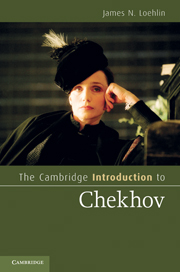Book contents
Chapter 3 - Early stories
Published online by Cambridge University Press: 05 June 2012
Summary
Chekhov's literary style evolved over the course of his life, as he went from writing short, mostly comic, pieces for newspapers like The Dragonfly and The Alarm Clock to more sustained and serious pieces for the so-called “thick journals” like Suvorin's New Times or Russian Thought. His fiction does maintain certain characteristic features throughout his career. His stories deal almost exclusively with the lives of ordinary Russians in the contemporary world that Chekhov knew. An economical opening, with little exposition; a concern with the interior life of the characters, revealed through tellingly chosen details; a carefully crafted ending, whether surprising or deflationary: all of these are constants in Chekhov's fiction. This chapter will cover the range of Chekhov's earlier stories, up to his first sustained masterpiece, The Steppe, from 1888. The works discussed will give a sense of the range of Chekhov's subject matter as well as the characteristic literary devices that emerge over the first decade of his career.
The most obvious feature of Chekhov's early stories is their economy, forced on him by the rigid line-counts of the papers for which he wrote. The need to jump right into the action of a story led to his characteristically brief openings, which he retained even when he had more column inches to work with. A piece of advice he often gave to beginning writers was to tear out the opening pages of a story: “One should write in such a way that the reader understands what is going on not through any explanation on the part of the author, but rather through the movement of the story and through the conversations and actions of the characters. Try tearing out the first half of your story; you will only have to change the beginning of the second half a bit, and the story will be completely understandable.”
- Type
- Chapter
- Information
- The Cambridge Introduction to Chekhov , pp. 34 - 57Publisher: Cambridge University PressPrint publication year: 2010



